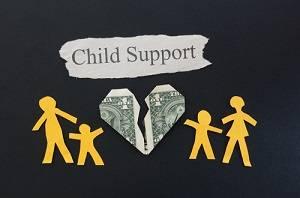Recent Blog Posts
Protecting Your Credit in Divorce
Posted on February 15, 2017 in Divorce
 Working through a divorce is one of the most emotionally challenging situations many people will ever experience. During this time, it is important to be aware of the potential negative impact that emotions can have your finances. While you, your spouse, and your legal representatives endeavor to reach an equitable agreement on the distribution of assets and liabilities acquired during the marriage, it is critical for you to be proactive about safeguarding your personal financial well-being.
Working through a divorce is one of the most emotionally challenging situations many people will ever experience. During this time, it is important to be aware of the potential negative impact that emotions can have your finances. While you, your spouse, and your legal representatives endeavor to reach an equitable agreement on the distribution of assets and liabilities acquired during the marriage, it is critical for you to be proactive about safeguarding your personal financial well-being.
Your Credit Score Is Your Report Card
We advise our clients who are involved in the divorce process that managing their finances must be a top priority. Safeguarding your credit is necessary so that you may have access to or qualify for:
- A mortgage or residential lease;
- Low interest rates on secured and unsecured debt; and
- Employment opportunities that require credit checks.
Continue Reading ››
What Will My Divorce Cost?
Posted on February 10, 2017 in Divorce
 One of the most common concerns among divorcing couples is how much the process is going to cost. While it is true that divorce can be expensive—both in terms of time and money—it is impossible to offer an exact estimate without reviewing all of the unique details of your case. The most reliable way to get a reasonable estimate is by speaking with an experienced divorce lawyer.
One of the most common concerns among divorcing couples is how much the process is going to cost. While it is true that divorce can be expensive—both in terms of time and money—it is impossible to offer an exact estimate without reviewing all of the unique details of your case. The most reliable way to get a reasonable estimate is by speaking with an experienced divorce lawyer.
What Will Affect the Cost of a Divorce?
There are quite a few factors that may influence the cost of your divorce. One of the most important considerations is whether the divorce is “contested” or “uncontested.”
In a contested divorce, the spouses disagree on certain factors crucial to the proceedings. These may include child support, the allocation of parental responsibilities, spousal support alimony, asset division, and much more. A contested divorce typically requires a significant amount time—yours and your attorney’s—to reach a resolution. Some contested divorces even end up going to trial, which can increase costs even more.
Continue Reading ››
Domestic Violence and 50 Shades of Grey
Posted on February 09, 2017 in Domestic Violence
 Author EL James was relatively unknown until 2011 when her book, 50 Shades of Grey, became a best-seller almost overnight. Since this initial spike in popularity, her trilogy has been turned into two movies. The second movie in the trilogy, 50 Shades Darker, was released about a week ago. Countless people purchased tickets to the film in advance and were excited to watch it. Others, however, vehemently decry the entire 50 Shades franchise as the glorification of domestic violence.
Author EL James was relatively unknown until 2011 when her book, 50 Shades of Grey, became a best-seller almost overnight. Since this initial spike in popularity, her trilogy has been turned into two movies. The second movie in the trilogy, 50 Shades Darker, was released about a week ago. Countless people purchased tickets to the film in advance and were excited to watch it. Others, however, vehemently decry the entire 50 Shades franchise as the glorification of domestic violence.
Promoting Domestic Violence?
Critics of the series claim that many of the main character’s behaviors are abusive and send a dangerous message to women. For example, the main character, Christian Grey, often threatens and intimidates his love interest, Ana, throughout the series. When Ana mentions leaving him, he replies "I would find you. I can track your cell phone, remember?" Ana also expresses fear of Christian many times. "He'd probably like to beat seven shades of (expletive) out of me…” Another part of the book that disturbs critics depicts Christian verbally berating Ana. When Ana confesses that she is pregnant with Christian’s child, he responds with anger and violence.
Continue Reading ››
Contesting a Divorce and Available Defenses
Posted on February 03, 2017 in Divorce
 A non-filing spouse may choose to “fight” a divorce for a variety of reasons. Many people do not want to accept blame for the couple’s problems. In other situations, there may be fear that fault for the breakup could be considered in a property or parenting agreement and the spouse does not want to be at risk for an unfavorable decision. Some people may want to stay married and believe that, given time, the couple could work things out, while other people simply do not like to lose. Whatever your reasons, it is important to know your options under the law.
A non-filing spouse may choose to “fight” a divorce for a variety of reasons. Many people do not want to accept blame for the couple’s problems. In other situations, there may be fear that fault for the breakup could be considered in a property or parenting agreement and the spouse does not want to be at risk for an unfavorable decision. Some people may want to stay married and believe that, given time, the couple could work things out, while other people simply do not like to lose. Whatever your reasons, it is important to know your options under the law.
Uncontested Divorce
To obtain a divorce in Illinois, the filing spouse must prove by a preponderance of the evidence that “irreconcilable differences have caused the irretrievable breakdown of the marriage” and that “efforts at reconciliation have failed or that future attempts at reconciliation would be impracticable and not in the best interests of the family.”
Continue Reading ››
Considerations for Co-Parents
Posted on January 30, 2017 in Child Custody and Support
 It can be very difficult to work out the details of a reasonable parenting plan during the process of a divorce. Often, there is animosity between the parents, and children tend to place the blame for their parents’ divorce on themselves. In this regard, the importance of providing a healthy co-parenting experience for children cannot be understated. Research has shown that children of divorced parents are often at risk to become disengaged from their parents, school routines and extracurricular activities. Establishing a workable co-parenting relationship and plan can help alleviate some of these risk factors.
It can be very difficult to work out the details of a reasonable parenting plan during the process of a divorce. Often, there is animosity between the parents, and children tend to place the blame for their parents’ divorce on themselves. In this regard, the importance of providing a healthy co-parenting experience for children cannot be understated. Research has shown that children of divorced parents are often at risk to become disengaged from their parents, school routines and extracurricular activities. Establishing a workable co-parenting relationship and plan can help alleviate some of these risk factors.
Respectful Communication is Critical
The first thing to remember when parents work on developing a co-parenting plan with one another is that the child’s needs should take top priority. It is also important to keep the child away from conflict as much as possible. Both parents should be respectful of each other, especially when their child is present. Children should not be caught in the middle of the situation, relaying messages from one parent to the other. Parents need to maintain open channels of communication for themselves.
Continue Reading ››
Understanding Discovery in an Illinois Divorce
Posted on January 26, 2017 in Divorce
 During a divorce proceeding in Illinois, both parties will typically be required to share financial information and other data so that the process can be completed in accordance with the law. The phase of the proceeding in which this information is exchanged is known as discovery. Additionally, discovery is also the time when all assets and debts must be declared so they can be factored into the marital settlement. Assets include:
During a divorce proceeding in Illinois, both parties will typically be required to share financial information and other data so that the process can be completed in accordance with the law. The phase of the proceeding in which this information is exchanged is known as discovery. Additionally, discovery is also the time when all assets and debts must be declared so they can be factored into the marital settlement. Assets include:
- Property and business interests;
- Bank accounts;
- Real estate holdings; and
- Pension and/or retirement funds and accounts.
Limited Discovery in an Uncontested Divorce Case
In an uncontested divorce proceeding, a limited discovery will generally occur wherein the parties willingly provide bank account, assets, and property information to achieve a quick settlement. This is because an uncontested divorce presumes that the parties are working together to streamline the process and have nothing to hide from one another.
Continue Reading ››
Legal Concerns Regarding Remarrying Your Ex-Spouse
Posted on January 24, 2017 in Divorce
 When you are dating someone, there are sometimes circumstances that may drive you apart. Over time, you may be able to reconcile with that person and resume your dating relationship. But what happens after you married? Is it possible to get divorced and remarry the same person in the future? While the idea of getting back together with an ex-spouse may seem completely outrageous to many people, the reality is that it does happen from time to time.
When you are dating someone, there are sometimes circumstances that may drive you apart. Over time, you may be able to reconcile with that person and resume your dating relationship. But what happens after you married? Is it possible to get divorced and remarry the same person in the future? While the idea of getting back together with an ex-spouse may seem completely outrageous to many people, the reality is that it does happen from time to time.
What the Law Says
According to the law in Illinois, an unmarried person is free to marry anyone of legal age who is not already legally married. The parties must also not be related by blood or adoption any closer than second cousins. (Marriage between first cousins is permitted in limited situations.) A person whose divorce has been finalized is not considered to be married under the law, so he or she is free to marry again. This means that if you and your former spouse decide to marry each other once more, there is nothing in the law that will prohibit the union.
Continue Reading ››
How Debt Is Handled in Divorce
Posted on January 18, 2017 in Property Division
 Initiating dissolution of marriage proceedings is not usually an easy decision for most couples. There can a be a wide variety of difficult issues to be addressed, depending upon the couple’s personal circumstances. Debt incurred by a couple going through a divorce proceeding in Illinois can be one of the more challenging issues to account for in a divorce settlement.
Initiating dissolution of marriage proceedings is not usually an easy decision for most couples. There can a be a wide variety of difficult issues to be addressed, depending upon the couple’s personal circumstances. Debt incurred by a couple going through a divorce proceeding in Illinois can be one of the more challenging issues to account for in a divorce settlement.
Debts acquired during the course of the marriage must still be paid back, regardless of the couple’s marital status. The debts acquired during the time of the marriage are considered marital. Any debt amassed before the spouses were married is considered non-marital and will remain with the original debtor.
Marital Debt Not Always Divided Equally
According to Illinois law, marital debts will be distributed between the spouses, but not necessarily split equally. Credit card debt, property and other types of debt will be divided as the court sees fit. Factors that influence their decision include: arrangement for the couple’s children, spousal support, the length of the marriage, and the needs of each spouse. Obligations owed to mortgage lenders or credit card companies can be assigned to either of the spouses but, if one does not pay the debt, the other could remain liable.
Continue Reading ››
Options for Continuing Child Support in Illinois
Posted on January 13, 2017 in Child Custody and Support
 Specific laws concerning child support can vary by state; however, parents everywhere have a legal obligation to their children to provide child support. When an order for child support is entered by an Illinois court, it is the responsibility of the paying parent to comply with the order at the risk of enforcement activity and possible sanctions by the court.
Specific laws concerning child support can vary by state; however, parents everywhere have a legal obligation to their children to provide child support. When an order for child support is entered by an Illinois court, it is the responsibility of the paying parent to comply with the order at the risk of enforcement activity and possible sanctions by the court.
Generally, child support payments are only required until the child has reached the age of 18 and he or she is no longer attending high school. Otherwise the order will remain in effect until the child turns 19 or graduates. In the case of special needs children, however, the obligation for support may need to extend well into adulthood.
Protecting Minors and Those With Special Needs
As written, the Illinois statutes regarding child support are intended to protect the financial well-being of minors and those unable to care for themselves. A child who is still attending high school, for example, is not usually considered to have the means to support him- or herself. If a child has not graduated high school by the time they turn 18, it is still the parent’s responsibility to provide for their child for up to another year. This is meant to ensure that the child is financially provided for while still a minor. If the child is emancipated before he or she graduates from high school, then a judge can decide whether or not to terminate child support before the child’s 18th birthday.
Continue Reading ››
Mediation as an Alternative to Divorce Litigation
Posted on January 11, 2017 in Mediation
 The “happily ever after” promise of fairy tales often create a view of marriage as a series of elegant candlelight dinners and a conflict-free relationship. Conversely, many people may have a romanticized view of divorce, believing that it will mean the end of burdensome relationships and the beginning of a carefree life. Anyone who has ever been married or divorced would probably dispute these ideas.
The “happily ever after” promise of fairy tales often create a view of marriage as a series of elegant candlelight dinners and a conflict-free relationship. Conversely, many people may have a romanticized view of divorce, believing that it will mean the end of burdensome relationships and the beginning of a carefree life. Anyone who has ever been married or divorced would probably dispute these ideas.
It is also not uncommon for a person to have a romanticized view of divorce litigation, often fueled by movies and television shows that depict gripping courtroom dramas. In many cases, the reality is far different; the emotional and financial costs pile up and result in a protracted legal battle that takes its toll on both spouses and their children. For some couples, mediation may provide an alternative to a courtroom standoff.
Control
One of the biggest advantages of mediation is that the parties have a tremendous amount of input into the final product. Instead of a judge who dictates terms, the husband and wife make most or all of the decisions concerning their family.
Continue Reading ››







 Working through a
Working through a  One of the most common concerns among divorcing couples is how much the process is going to cost. While it is true that
One of the most common concerns among divorcing couples is how much the process is going to cost. While it is true that  Author EL James was relatively unknown until 2011 when her book, 50 Shades of Grey, became a best-seller almost overnight. Since this initial spike in popularity, her trilogy has been turned into two movies. The second movie in the trilogy, 50 Shades Darker, was released about a week ago. Countless people purchased tickets to the film in advance and were excited to watch it. Others, however, vehemently decry the entire 50 Shades franchise as the glorification of
Author EL James was relatively unknown until 2011 when her book, 50 Shades of Grey, became a best-seller almost overnight. Since this initial spike in popularity, her trilogy has been turned into two movies. The second movie in the trilogy, 50 Shades Darker, was released about a week ago. Countless people purchased tickets to the film in advance and were excited to watch it. Others, however, vehemently decry the entire 50 Shades franchise as the glorification of  A non-filing spouse may choose to “fight” a
A non-filing spouse may choose to “fight” a  It can be very difficult to work out the details of a reasonable
It can be very difficult to work out the details of a reasonable  During a
During a  When you are dating someone, there are sometimes circumstances that may drive you apart. Over time, you may be able to reconcile with that person and resume your dating relationship. But what happens after you married? Is it possible to get
When you are dating someone, there are sometimes circumstances that may drive you apart. Over time, you may be able to reconcile with that person and resume your dating relationship. But what happens after you married? Is it possible to get  Initiating dissolution of marriage proceedings is not usually an easy decision for most couples. There can a be a wide variety of difficult issues to be addressed, depending upon the couple’s personal circumstances.
Initiating dissolution of marriage proceedings is not usually an easy decision for most couples. There can a be a wide variety of difficult issues to be addressed, depending upon the couple’s personal circumstances.  Specific laws concerning
Specific laws concerning  The “happily ever after” promise of fairy tales often create a view of marriage as a series of elegant candlelight dinners and a conflict-free relationship. Conversely, many people may have a romanticized view of divorce, believing that it will mean the end of burdensome relationships and the beginning of a carefree life. Anyone who has ever been married or divorced would probably dispute these ideas.
The “happily ever after” promise of fairy tales often create a view of marriage as a series of elegant candlelight dinners and a conflict-free relationship. Conversely, many people may have a romanticized view of divorce, believing that it will mean the end of burdensome relationships and the beginning of a carefree life. Anyone who has ever been married or divorced would probably dispute these ideas.